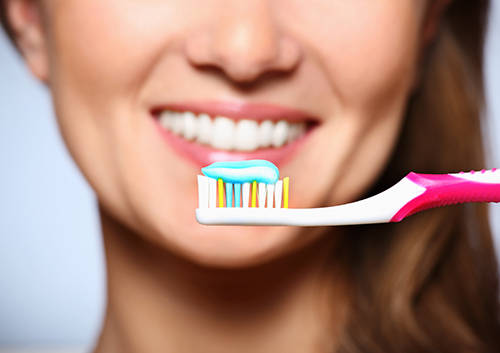Cleaning Your Teeth—Time for a Refresher Course!
May 28th, 2024

Let’s face it, by now, brushing our teeth is something we pretty much do on auto-pilot. A quick brush after breakfast, a minute or so at night, floss when we think of it. Done. But take a few minutes to review these cleaning tips, and see if a few small adjustments to your routine could make all the difference at your next checkup at our Anthem office.
- Tools
Some of us prefer brushing with a manual brush. Some like the electric brush for ease and comfort. Whichever form of brush you choose, be sure that it fits comfortably in your mouth, reaches everywhere it needs to, and has a handle that is easy to grip. There are many bristle options available, so if you are an energetic brusher, or if you have sensitive gums, try a soft bristled brush for gentler brushing.
If you haven’t been exploring the floss aisle lately, there are now many varieties available to suit your particular needs. Besides the traditional floss, there are coated flosses for easy gliding between teeth that fit closely together, dental tape-style flosses to fit teeth with wider spacing, and even flosses designed just for braces that thread between the wires and brackets. Talk to Drs. Peter Vogel, Vijal Vadecha at your next cleaning for product suggestions if you think there’s an easier, more comfortable option out there for you.
- Technique
With proper technique, any toothbrush and floss you choose will do a fine job of removing plaque.
Brushing? There’s a tried and true method for success. Place the toothbrush at a 45° angle at the gum line. Be sure to brush the outside, inside, and chewing surface of each tooth thoroughly. Remember the expression, “Massage, don’t scrub.” Over-vigorous brushing can actually irritate gum tissue and damage enamel. An electric toothbrush should provide a continuous brushing motion without needing any pressure from the brusher. This might be the model for you if you have a too-vigorous approach to brushing, or sensitive teeth and gums. If you like your manual brush, again, give a soft-bristled brush a try!
As for flossing? That harmless-looking little string can cause gum damage if used too forcefully. You can accomplish the placement and cleaning power you need by easing the floss down to the gumline and flossing with gentle pressure against the tooth surface. If you have any questions about technique, remember—we are always happy to let you know the best cleaning methods for your specific needs.
- Timing
Of course, the best tools and the best technique in the world won’t be effective unless you put the right amount of time into brushing and flossing.
The standard rule is two minutes of brushing in the morning and two minutes at night. If you wear braces or have other special circumstances, we might recommend brushing after every meal. And if you brush after breakfast, give your teeth half an hour or so to remineralize. This natural process uses the calcium and phosphate ions in your saliva to strengthen tooth enamel after it’s been exposed to any acidic foods in your breakfast.
Thorough flossing can be accomplished in a few minutes, and might be needed only once a day. But again, depending on your individual needs, we might have other recommendations. Let’s review what works for you at your next visit—we can tailor suggestions for a brushing routine to your unique needs.
It’s a great idea to review your brushing habits periodically to make sure you are getting the most out of those minutes you spend cleaning your teeth. There won’t be a test at the end of this review, and you won’t get a gratifying grade or a gold star. What you will get is much more important—better checkups, fewer cavities, and healthy teeth and gums. Happy cleaning!
Something To Chew On
May 27th, 2024

Chewing gum can be a sticky problem. We’re not talking about etiquette, or nutrition, or how to get rid of the darned stuff when you don’t have a trash container handy. No, we’re talking about gum and its effects on dental health. So, let’s take a moment to chew over the benefits and drawbacks of chewing gum.
- First, the Good News about Gum
One of the important benefits of chewing gum is increased saliva production. This might not sound especially appealing, but here’s an important fact: saliva is one of oral health’s unsung heroes.
Saliva helps wash away food particles which feed the bacteria in plaque. It helps neutralize acids in the mouth which can damage tooth enamel. The minerals in saliva actually help rebuild weak spots in our enamel.
And, since sugar-free gum has revolutionized the gum-chewing world, we don’t bathe our teeth in sugar while we chew. This is a major advantage, and it’s why sugar-free gums are the only products which are ADA approved. A possible downside? Some people who chew certain sugar-free gums (especially people who chew a lot of them) can experience digestive problems.
- What about Dental Work?
Yes, gum can be tricky for dentures, crowns, braces, and other dental work, especially with very sticky and chewy products. There are gums out there that claim to be safe for dental work, but finding the right gum can involve some trial and error that you might prefer to avoid. This is a good subject to discuss with Drs. Peter Vogel, Vijal Vadecha.
If you have a temporary crown protecting a tooth until your permanent crown is ready, avoid gum entirely until your restoration is complete. The pulling effect of sticky, chewy gum can make your temporary crown even more temporary than you were expecting! After your crown’s finished, talk to your dentist about chewing gum again.
- “Chews” Wisely
Chewing means jaw movement and pressure. Hours of chewing means hours of jaw movement and pressure. If your jaws ache after a gum marathon, maybe it’s time to cut back! But, if your jaws ache whenever you chew, that’s a sign that a visit to our Anthem office is in order.
The temporomandibular joint (TMJ) is a kind of hinge which allows your mouth to open and close and move from side to side—in other words, to talk, eat, drink, yawn, make faces—all those things we do all day long. Recurring jaw pain can be a sign of TMJ (temporomandibular joint) disorder.
Bruxism, or tooth grinding, is another reason to leave gum off your shopping list. When you grind your teeth, you’re putting stress on your teeth and jaws which can lead to cracked and chipped teeth, headaches, and tooth and jaw pain. If you’re working on getting your bruxism under control, you’ll want to avoid chewing gum and other habits which cause jaw clenching.
You and your dentist are the people who know your oral health best. If you suffer from dry mouth and think chewing gum might help with saliva flow, or if you’re worried about your dental work being damaged by gum, or if you have jaw pain when you chew, or if you have any concerns about your oral health, visit Daisy Mountain Dentistry for all the answers to your sticky questions.
Healthy Gums and Older Adults
May 9th, 2024

One of the most important parts of staying healthy as we grow older is being open to learning new ways of staying healthy! While worrying about braces or wisdom teeth might be a thing of the past, there are new dental concerns that come with mature years. Taking care of our gums is one way to maintain not only our dental health, but to look out for our overall health as well.
- Periodontal disease is preventable for older adults
While gum disease is all-too-common among older adults, it isn’t really a result of the aging process itself. If you have been keeping a regular schedule of brushing and flossing (two minutes twice a day), and have been making routine visits to our office for exams and cleaning, you probably have avoided gum disease. But if you have been neglecting your dental care, gingivitis and periodontitis are conditions that only become more serious over time.
The first symptoms of gingivitis include puffy, swollen gums that may bleed easily. Persistent bad breath and changes in the bite or the fit of dentures are also indications of gum disease. As gum disease progresses it leads to periodontitis. The gum tissue pulls away from the teeth, leaving deep pockets of tissue where plaque can collect and infections can develop. Infection, left untreated, can lead to loose teeth and even bone and tooth loss.
The good news? It is never too late to treat gum disease. Most gingivitis is reversible, and modern periodontal treatment makes use of deep cleaning, antibiotics, and even gum surgery to restore gum health. Don’t let past neglect lead to future tooth loss. We are happy to see you any time to treat your gums and teeth and to let you know ways to protect them for a happy, healthy future.
What new concerns do we face as we age?
- Our gums recede.
This natural recession can lead to the exposure of the root areas of the teeth, which are more vulnerable to cavities. It’s very important to keep up with brushing, flossing, and regular check-ups to catch potential small problems before they become big ones.
- Old fillings and dental work can break down.
Call our Anthem office any time you notice a problem with a filling, and keep up with exams, where we can pinpoint fillings that need replacement and detect cavities that can develop near the edges of old work.
- Medications can cause side effects that affect our gums.
Some medications cause the growth of puffy gum tissue. Some can cause dry mouth, which can lead to gum disease. Always let us know about any health conditions you have or medications you may be taking. We can suggest a number of options to reduce or eliminate effects on your mouth and gums.
- Gum health and our overall health—what’s the connection?
While no one has discovered an absolute relationship between gum disease and other health problems, there is growing evidence that higher rates of diabetes complications, heart disease, and stroke are linked to higher levels of gum disease. Make your medical and dental health a priority.
- Smoking risks increase with age.
Studies have shown smokers have not only a greater risk of gum disease, but more severe gum disease as well. Your risk of developing oral cancer also increases with every year you smoke. It is never too late to quit! Talk to us about suggestions for breaking the habit once and for all, and be sure to keep up with regular checkups for early detection and treatment of any oral diseases caused by smoking.
Please let us know any changes that have taken place in your dental habits, medical condition, or medications. Talk to us about any periodontal concerns you may have, or the latest dental procedures we offer for gum care and treatment. We can let you know about products that can make brushing and flossing easier as you age.
It’s never too late or too early to think about taking care of yourself. We are happy to offer suggestions for maintaining or restoring your dental health that will serve you well in any chapter of your life.
What's the best dental floss?
May 2nd, 2024

Dental floss is similar to a lot of products that depend mainly on the consumer’s preference. Fact is, floss comes in a wide variety of flavors, coatings, and other variations, but all types of floss essentially do the same thing. After all, that is what is most important: that the dental floss you buy is functional—cleaning the areas in between your teeth. If you want to know what the best dental floss is, the answer is the kind that enables you to successfully and regularly clean those areas. So to help you find the right type of floss for you, here are some options.
Flavored Dental Floss
Many people that floss prefer a flavored dental floss because it freshens their breath even more than unscented floss. The latter can also take on the smells associated with bacteria in your mouth. And we all know how bad that can be. So, if flavored dental floss is what you prefer, and it allows you to floss your teeth regularly, then it is automatically best for your mouth.
Flossers
There are also products on the market called flossers, which usually consist of a plastic instrument with strung floss and a pick on the opposite end. This option can be both effective at cleaning the areas in between your teeth and scraping off plaque. These flossers also come flavored in mint and various other varieties.
Gentle Dental Floss
Some people find that typical dental floss is too harsh on their gums. For that reason some companies make floss with soft coatings that are less abrasive on the gums. For the most part these types of floss are just as effective as regular floss, and for those people that require a more sensitive approach to flossing, especially when just starting out, this is the best option.
Of the aforementioned options, it is difficult to name an absolute best type of floss. However, Drs. Peter Vogel, Vijal Vadecha and our team say that the type of floss that works best for you, giving you the greatest chance of succeeding at regular flossing, is the best. For more information on floss, contact our Anthem office.


